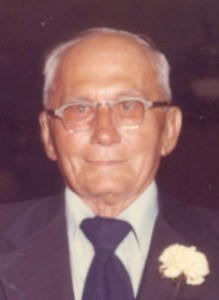
Every time I went over to see my Grandma and Grandpa Voigt (that is pronounced “Foeht”, not “Voit”), Grandpa greeted me with a resounding “Gutten Tog Hair Foeht. Vie gayts?” in German. Unusually he was sitting on the porch smoking his pipe and watching the humming birds at the two feeders he kept full. Of course the answer was always “Gayt gut” as I walked up the stairs to the porch (rather loudly, since Grandpa was a little hard of hearing.) It took me a while to fully understand why he got such a kick out of it.
On the one hand, I think he enjoyed trying to speak German to his grandson. I was the first generation to not speak German in the home since the family arrived in Texas in 1844. To learn it, I took German in High School — getting some of the lowest grades of my high school years. I would listen to my Grandma and Grandpa talk to Daddy and try to understand what was being said. Most of the time I could generally figure it out given the number of English words that crept into the Texas-German dialect in New Braunfels. But I never really got a hold of it. Even after the classes in High School, they talked just fast enough that I was always a few seconds behind in the mental translation.
But I think Grandpa also got a kick out of the “Hair Foaht” because he could call me that. Daddy was his only surviving son. So besides Daddy and Grandpa’s brother Ervin, I was the only other family member he could call “Hair Foeht”. This is not to say he did not care for his other 17 grandsons (and 3 granddaughters) — I know he did. I just happened to be the one that carried on the family name. Now as a father and as many other fathers and grandfathers know, that can at times be special.
And to be honest, I got a kick out of it too.
NOTE: Those that know German will recognize the “”Gutten Tog Hair Foeht. Vie gayts?” as really “Guten Tag Herr Voigt. Wie Gehts?” in German. This is the equivalent of “Good Day Mr. Voigt. How is it going?” in English. “Gayt gut” is really “Geht Gut” in German, which is short for “Es geht Gut”. This is the same as “It goes well” in English. This dialogue is a very standard German exchange of greetings.
